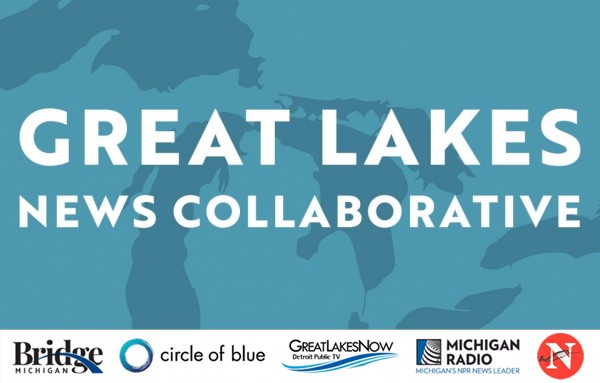Fresh, July 23, 2024: Bad River Band Proposes Project to Slow Riverbank Erosion Near Line 5 Oil Pipeline
July 23, 2024
Fresh is a biweekly newsletter from Circle of Blue that unpacks the biggest international, state, and local policy news stories facing the Great Lakes region today. Sign up for Fresh: A Great Lakes Policy Briefing, straight to your inbox, every other Tuesday.
— Christian Thorsberg, Interim Fresh Editor
This Week’s Watersheds
- South Barrington, Illinois, has become the latest Chicagoland suburb to initiate the process of receiving its water from Lake Michigan.
- The Bad River Band of Lake Superior Chippewa has submitted a new plan to slow erosion near the Enbridge Line 5 oil pipeline.
- Across Wisconsin, 31 communities will receive a collective $1.3 million for conservation, scientific, and educational projects along Lake Michigan’s coast.
- A leak at a north-central Minnesota coal-fired power plant spilled an estimated 5.5 million gallons of sulfate- and boron-infused wastewater into Blackwater Creek.
After severe storms hit Toronto last week, more than 1.3 billion liters of partially treated sewage spilled into city waterways.
“We have aging infrastructure that can no longer handle the volume of effluent. What happened yesterday went above and beyond, we had sewers backing up into our streets, into our roads, into our waterfronts. Untreated sewage went into basements, into the TTC, on to our roadways, and eventually into our rivers and our beaches.” — Gregary Ford, vice president of Swim Drink Fish Canada.
More than six inches of rain fell on the Greater Toronto Area last week — including nearly four inches on July 16 alone — overwhelming the city’s treatment plants and spilling some 1.3 billion liters of partially treated wastewater into Lake Ontario.
Usually, only fully treated wastewater is released into the lake. But during major rainstorms, the sudden influx in volume causes the city’s infrastructure — hence three plants spilling the equivalent of 500 Olympic-size swimming pools of partially treated sewage, CBC reports.
Twenty beaches were declared unsafe for swimming, due to elevated levels of e. Coli, pharmaceuticals, microplastics, feces, and other harmful bacteria and waste. The threats of such a spill to public health can persist for weeks, according to the Toronto Star.
Fresh from the Great Lakes News Collaborative
- Emails show North Bay plastics company unclear on environmental permits — The Narwhal
- Reef Rescue and Wild Edibles: Cleaning up toxins caused by copper mining, and foraging for Great Lakes wild foods — Great Lakes Now
- Washtenaw County has yearly test results tracking dioxane plume in residential drinking wells — Michigan Public
-
Michigan beaches continue to close amid high E. coli levels — Bridge Michigan
Bridge Michigan, Circle of Blue, Great Lakes Now at Detroit Public Television, Michigan Public and The Narwhal work together to report on the most pressing threats to the Great Lakes region’s water. This independent journalism is supported by the Charles Stewart Mott Foundation. Find all the work here.
Bad River Band Proposes Log Jacks to Slow Riverbank Erosion
While the Bad River Band of Lake Superior Chippewa continues to urge energy company Enbridge to remove the Line 5 oil pipeline from their Tribal lands and watershed, the band’s engineers have submitted a new proposal to slow the erosion of the Bad River, known as Mashkiiziibii. They are also inviting the company to work with them.
In a letter to Gregory Ebel, the president and CEO of Enbridge, the band detailed a plan to install removable, interlocking tree logs, called log jacks, along Mashkiiziibii’s shoreline. The plan is a counterproposal to several erosion-slowing designs that Enbridge had previously put forth, which included the installation of rocks, sandbags, docks, and dams. The band’s log jack design prioritizes natural materials, limits the use of heavy machinery, and would require 90 percent fewer helicopter flights than the last project Enbridge designed.
Line 5 is within just 11 feet of Mashkiiziibii, threatening the shoreline’s waters, wildlife, foods, and flora with the potential spill of oil and natural gas liquids should further erosion occur.
The band’s officials, albeit reluctantly, have invited Enbridge to collaborate with them on this project to slow erosion. Last June, a federal judge ruled that the energy company has until June 2026 to remove the pipeline from the watershed. Enbridge is currently appealing that decision.
“We should not be in this position where protecting this sacred place means letting a trespassing corporation further interfere with Maskhiiziibii,” Robert Blanchard, the Bad River Band of Lake Superior Chippewa tribal chair, told Wisconsin Public Radio. “Other tribes aren’t made to endure continued trespasses. Responsible companies, including other oil companies, respect tribal rights without waiting for a court order.”
In the News
South Barrington: The Chicagoland suburb of roughly 5,000 people is one step closer to receiving Lake Michigan water to its taps, the Daily Herald reports, after hiring an outside firm to “obtain an allocation of lake water from the Illinois Department of Natural Resources.” If granted state approval, the village would join a consortium of seven other communities who together receive about 45 million gallons of lake water per day.
In context: Chicago Suburbs, Running Out of Water, Will Tap Lake Michigan
Minnesota Power: A leaky underground pipe at the company’s coal-fired Boswell Energy Center in Cohasset, Minnesota, discharged an estimated 5.5 million gallons of wastewater into a nearby creek last week — about five times more than initially reported, Minnesota Public Radio reports. Modeling at Blackwater Lake, to which the creek flows, has shown high levels of sulfate and boron in the watershed. The Leech Lake Band of Ojibwe are being consulted before the company excavates the spill area to remove contaminants.
Looking Ahead
Wisconsin Coastal Management Program: The program, part of the Wisconsin Department of Administration, has allocated $1.3 million for 31 different projects along the state’s Lake Michigan shoreline. Among the initiatives are the restoration of 31 acres of native forest in Milwaukee County, flood resilience studies along the East River watershed in Brown County, and a coastal and wetland bird habitat restoration initiative in Manitowoc, near the Little Manitowoc River.
Upcoming Events
July 30 — Due date for nominations to serve on the EPA’s Great Lakes Advisory Board — learn more
August 9 — American Great Lakes Ports Association 2024 Annual Conference — learn more
Other News
Embarrass River Parasite: In a new study published in the journal Parasitologia, researchers found that several freshwater mussels that succumbed in a mass die-off in Shawano County, Wisconsin, six years ago had been infected by a parasitic fungus, Wisconsin Public Radio reports.
Lake Erie Algae: NOAA has forecasted a “moderate to above moderate” harmful algal bloom for west Lake Erie this summer, registering about the same severity as last year — “above what scientists would like to see,” Ideastream Public Radio reports.
Christian Thorsberg is an environmental writer from Chicago. He is passionate about climate and cultural phenomena that often appear slow or invisible, and he examines these themes in his journalism, poetry, and fiction.









Leave a Reply
Want to join the discussion?Feel free to contribute!